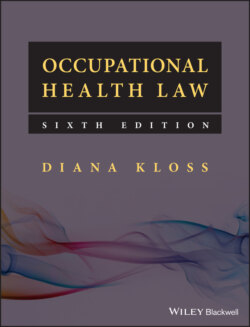Читать книгу Occupational Health Law - Diana Kloss - Страница 35
1.2 The legal obligations of the employer
ОглавлениеThe law imposes a number of specific obligations on the employer relating to the health of their workers and, more generally, the Health and Safety at Work Act obliges them to ensure their health and safety so far as is reasonably practicable. As yet, there is no specific duty in our law on the employer to provide qualified medical or nursing staff at the place of work.
The Health and Safety (First Aid) Regulations 1981 oblige employers to provide adequate and appropriate first‐aid equipment and facilities and an appropriate number of adequately qualified and trained persons to render first aid to his employees. The First Aid Approved Code of Practice ceased to have effect in 2013 and was replaced by HSE Guidance which was updated in 2018. Also, in 2013 the requirement that the HSE approve first aid training and qualifications was removed. Employers must assess their first aid requirements appropriate to their particular circumstances and the hazards in their workplace. Adequate facilities and equipment for rendering assistance to workers in the workplace in a case of accident or illness and for summoning an ambulance in an emergency must be provided. They must ensure that, if first aiders are appointed, they are provided with suitable training and have an appropriate first aid qualification which is regularly renewed. Where qualified doctors, nurses or paramedics are employed they can act as first aiders without additional training. In a low risk environment it may be sufficient to provide a first aid box and an appointed person (not necessarily a trained first aider) to take charge in an emergency. The number of employees on the site is a relevant consideration. Employers are not obliged by the First Aid Regulations to make provision for members of the public, although the practice of organisations like schools and places of entertainment in making first aid provision for non‐employees is strongly recommended by the HSE. The employer owes duties under the Health and Safety at Work Act 1974 both to his employees and also to people not employed by him. Employers must inform employees of the arrangements that have been made for first aid in the workplace. First aid does not include giving tablets or medicines to treat illness, except aspirin to someone with a suspected heart attack.
In recent years there has been a move towards putting pressure on employers to provide mental health first aid, though this is as yet not covered by the regulations. Mental health first aider training has become popular and has been supported by several large employers. At time of writing there was little evidence of its effectiveness, other than to help to reduce the stigma of mental illness. Detailed research is needed. This training should be distinguished from the training of managers in sensitivity to workers with stress and mental health problems, and how best to assist them.
As regards legal liability, first aiders owe a duty of care and a duty of confidence to those whom they assist. There is no responsibility in law as a Good Samaritan to go to the help of a stranger, although if assistance is given, reasonable care must be taken. However, first aiders appointed by the employer are not Good Samaritans. They hold themselves out as providing a service for which they are paid and therefore have a duty to assist if called upon; the standard of care expected is that of a reasonably competent trained first aider, not a doctor or nurse. The Compensation Act 2006 provides that when a court is considering a claim for negligence or breach of statutory duty it may consider whether the taking of reasonable steps to meet a standard of care might prevent a desirable activity from being undertaken (Chapter 6). The Social Action, Responsibility and Heroism Act 2015 provides that courts should take into account whether the person being sued acted for the benefit of society or its members in a predominantly responsible way or heroically in an emergency to assist another. No case has so far been recorded of a first aider being held legally liable, but it is advisable that they be covered by the employer’s liability and public liability insurance.
It will be noted that there is no obligation in these regulations to have a qualified doctor, nurse or paramedic on the premises or available. However, when workers are employed in especially hazardous processes, like working with asbestos, lead or ionising radiations, or with hazardous substances, vibrating tools or in a noisy environment, statutory regulations may require regular health surveillance, which will demand the occasional presence of qualified health professionals at least to supervise regular examinations (Chapter 4).
